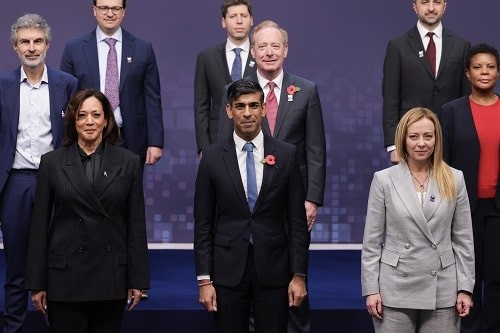AI Safety Summit a ‘missed opportunity’ for worker safety, says open letter to Prime Minister Rishi Sunak.
News
Working people should have say in AI, not just ‘tech bros and politicians’
Workers most affected by AI have been marginalised by the AI Safety Summit taking place at Bletchley Park this week, according to a letter signed by trade unions, UK human rights organisations and the AI Council, the former independent expert committee which advised the government on AI strategy.
The letter says the event has invited a ‘select few corporations’ to shape the rules. “Your ‘Global Summit on AI Safety’ seeks to tackle the transformational risks and benefits of AI, [a technology that] will fundamentally alter the way we live, work, and relate to one another,” it says.
“Yet the communities and workers most affected by AI have been marginalised by the Summit. The involvement of civil society organisations that bring a diversity of expertise and perspectives has been selective and limited. This is a missed opportunity.”
 Prime Minister Rishi Sunak and others at AI Summit. Photograph: UK government / Flickr
Prime Minister Rishi Sunak and others at AI Summit. Photograph: UK government / Flickr
The letter has been coordinated by the TUC, Connected by Data and Open Rights Group and was released for the official AI Summit at Bletchley Park on 1 and 2 November.
Among the 100 plus signatories are the Alan Turing Institute, Amnesty International, Consumers International, academics at the University of Cambridge, NASUWT, the teachers union and the American Federation of Labor and Congress of Industrial Organizations (AFL-CIO), representing 60 unions.
It follows concerns about threats to worker safety from AI which were shared last month by Lawrence Webb, President of the Institution of Occupational Safety and Health (IOSH).
Speaking at the annual conference of the Asian Pacific Occupational Safety and Health Organisation on 24 October, Webb spoke of AI’s ‘game-changing level of performance’, not just in terms of productivity but also in making workers safer.
But he thought there was a danger that organisations who lack the experience needed to make use of the emerging technologies will leave their people vulnerable in terms of their safety and health.
“Before we let our new digital capability run away with us, we must be aware of its threats to worker health and safety if it’s allowed to be adopted in the workplace unchecked and unregulated.
“We need to stop and build a constructive framework for the design, adoption and implementation of technologies with the potential to transform work and working lives.”
TUC Assistant General Secretary Kate Bell commented: “It shouldn’t just be tech bros and politicians who get to shape the future of AI.”
“It is hugely disappointing that unions and wider civil society have been denied proper representation at this Summit.
“AI is already making life-changing decisions – like how we work, how we’re hired and who gets fired. But working people have yet to be given a seat at the table.”
Read the open letter to the UK Prime Minister here
NEWS
Sexual misconduct in dentistry: former GDC fellow warns of ‘culture of silence’
By Belinda Liversedge on 05 February 2026
A former General Dental Council (GDC) clinical fellow is calling for a radical shift in how the dental sector manages workplace risk, warning that a “culture of silence” is masking the problem of sexual misconduct in the profession.

Tinnitus UK demands national safety standard as live music workers face hearing loss epidemic
By Belinda Liversedge on 03 February 2026
Tinnitus UK is calling for clear, enforceable standards on hearing protection and training after a staggering 93 per cent of live music workers report hearing problems.

New research links leadership values to reduced workplace incidents
By Belinda Liversedge on 30 January 2026
Age and gender matter less than leaders’ values when it comes to influence on safety performance, reveals new research.



